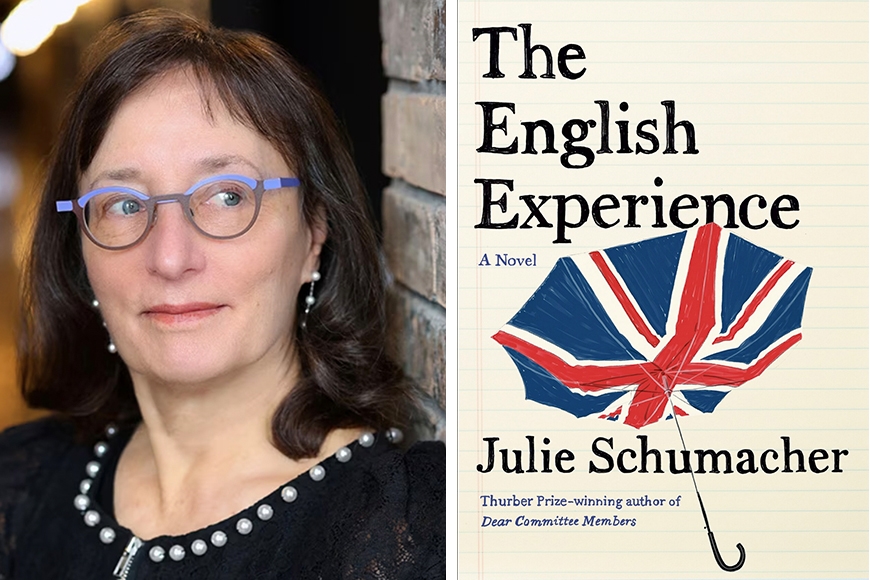Julie Schumacher Wraps Up the Dear Committee Members Trilogy
Regents Professor Julie Schumacher didn’t set out to write the 2014 novel Dear Committee Members imagining it would be the beginning of a trilogy: she was simply interested in the challenge of whether she could write a novel comprised of letters of recommendation, which she had noticed were taking up a not insignificant amount of her time. But in the process of creating what became the bestselling recipient of the Thurber Prize for American Humor, Schumacher fell for her protagonist, leading to further adventures for grumpy English professor Jason Fitger. First came The Shakespeare Requirement (2018), and now The English Experience, inspired in part by Schumacher shepherding abroad a group of first-year students for her course "Eat, Write, Learn: Creative Writing in Spain." (She’ll be teaching the class for the third time this spring.) Schumacher graciously addressed via email this closing of her Professor Fitger chapter.
Update: Professor Schumacher has been long-listed for the Joyce Carol Oates Prize, given annually to a "mid-career fiction writer who has earned a distinguished reputation and the approbation and gratitude of readers."
Are you ready to let go of the daily practice of channeling Professor Fitger, or has he taken over a corner of your brain?
Jason Fitger has taken over a very large corner of my brain: he moved out of the modest condo he'd been living in when I began the first of the trilogy and now occupies acres of brain-territory. I don't think I'll ever be free of him, or want to be free of him, as cantankerous as he can be. As for the question of “daily practice”: I will confess here that I don't adhere to that model, which has always felt somewhat tyrannical to me. I sometimes go weeks or months without writing a word (beyond comments on student work). And that's okay. I don't like the idea of writers beating themselves up when they don't meet a particular quota. The writing has to fit into the life.
You have talked about how Dear Committee Members began as a challenge of form. Do you find that you are drawn to writing projects that pose a puzzle?
I don't care for the blank page; I like to be given an assignment or a set of parameters in order to begin a writing project, as a way of dealing with the anxiety of starting from scratch. So, yes, in DCM, I restricted myself to letters of recommendation. In The English Experience I gave myself a somewhat less restrictive assignment: write a novel that partially consists of undergraduate essays. I guess this is puzzle-solving of a sort; and the fact that I'm trying to solve a puzzle distracts me from the fact that I'm writing a novel—which is always helpful to me.
With (fictional) student essays figuring prominently in The English Experience, how did you think about shaping their voices?
I definitely didn't want to poke fun at or condescend to the student characters. I satirize everyone in the novel—satire is an equal-opportunity perspective. Though I did begin with somewhat broad ideas of the novel’s undergraduates, my hope is that gradually both Fitger and the reader come to see the undergrads as individuals free of categories: rather than "the shy one," "the tall one," etc., they become complicated people with histories and futures. And, while Fitger doesn't want to go to England, and doesn't want to take a group of students abroad, in doing those things he opens himself up to new perspectives and the possibility of change—all the things that are advertised to students when they sign up for a travel experience.
At the core of these books is resistance against the idea that the humanities, and literature studies in particular, are less valuable than fields such as technology and engineering. How are you feeling about this challenge these days? (Has having our own freshly renovated building made a difference?)
This is why I can't get Jason Fitger out of my head—he's fighting for literature and art and writing, clumsily but determinedly trying to hold back the rising tide of STEM-centered education. And to think that I began the trilogy with no inkling of Chat GPT and its ilk.... Will Pillsbury Hall save us? It's a beautiful building. I think it will help.



